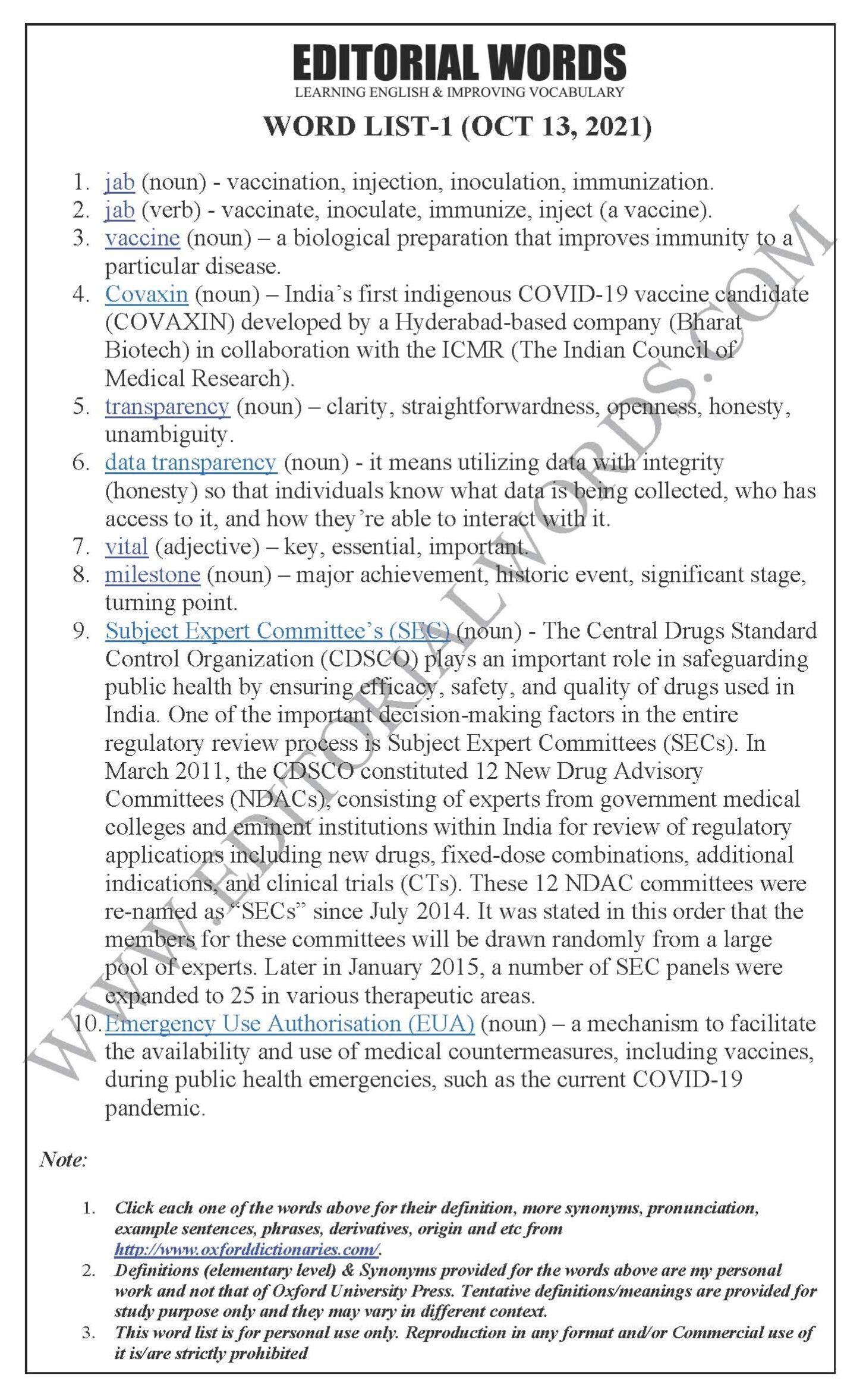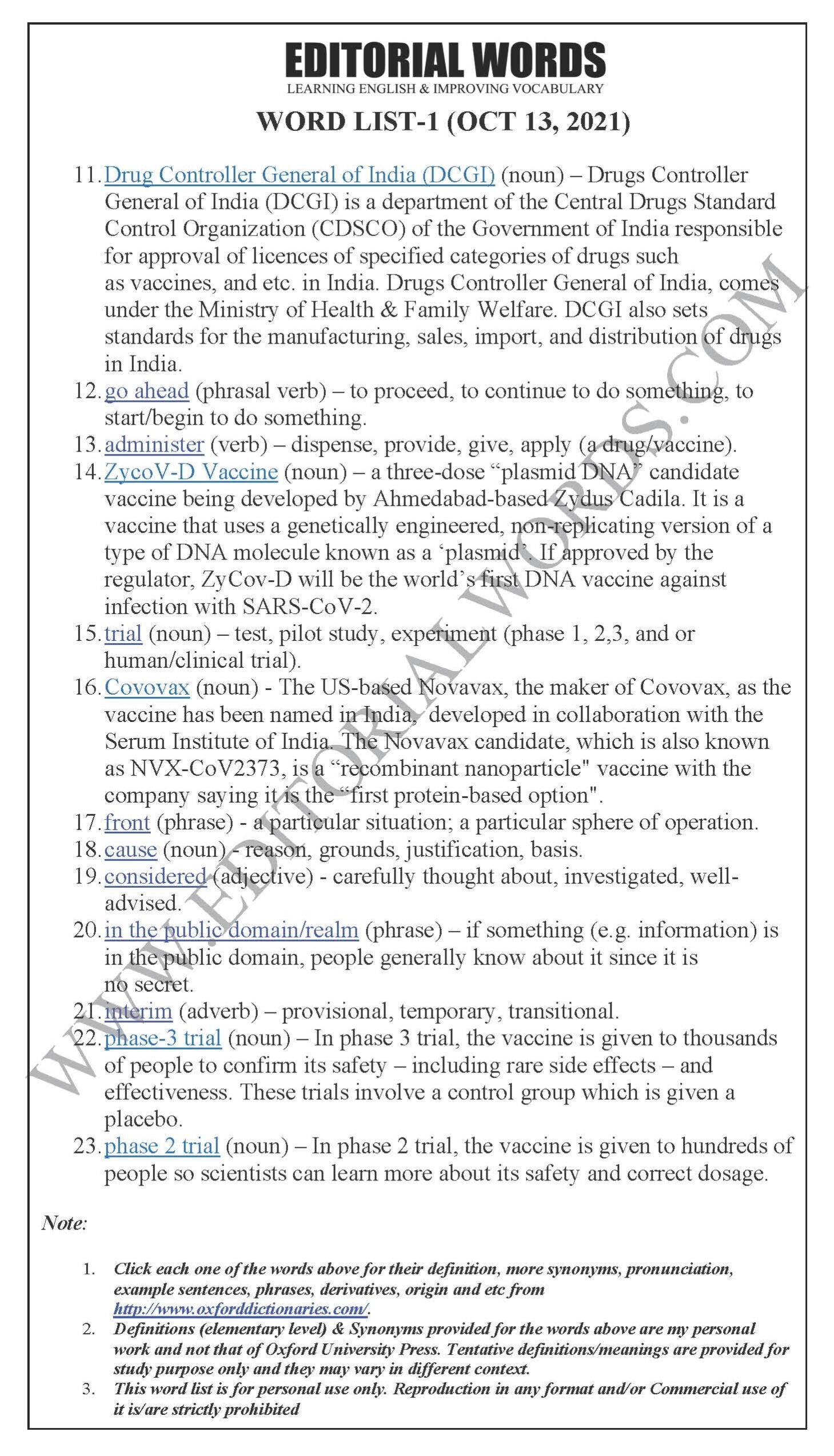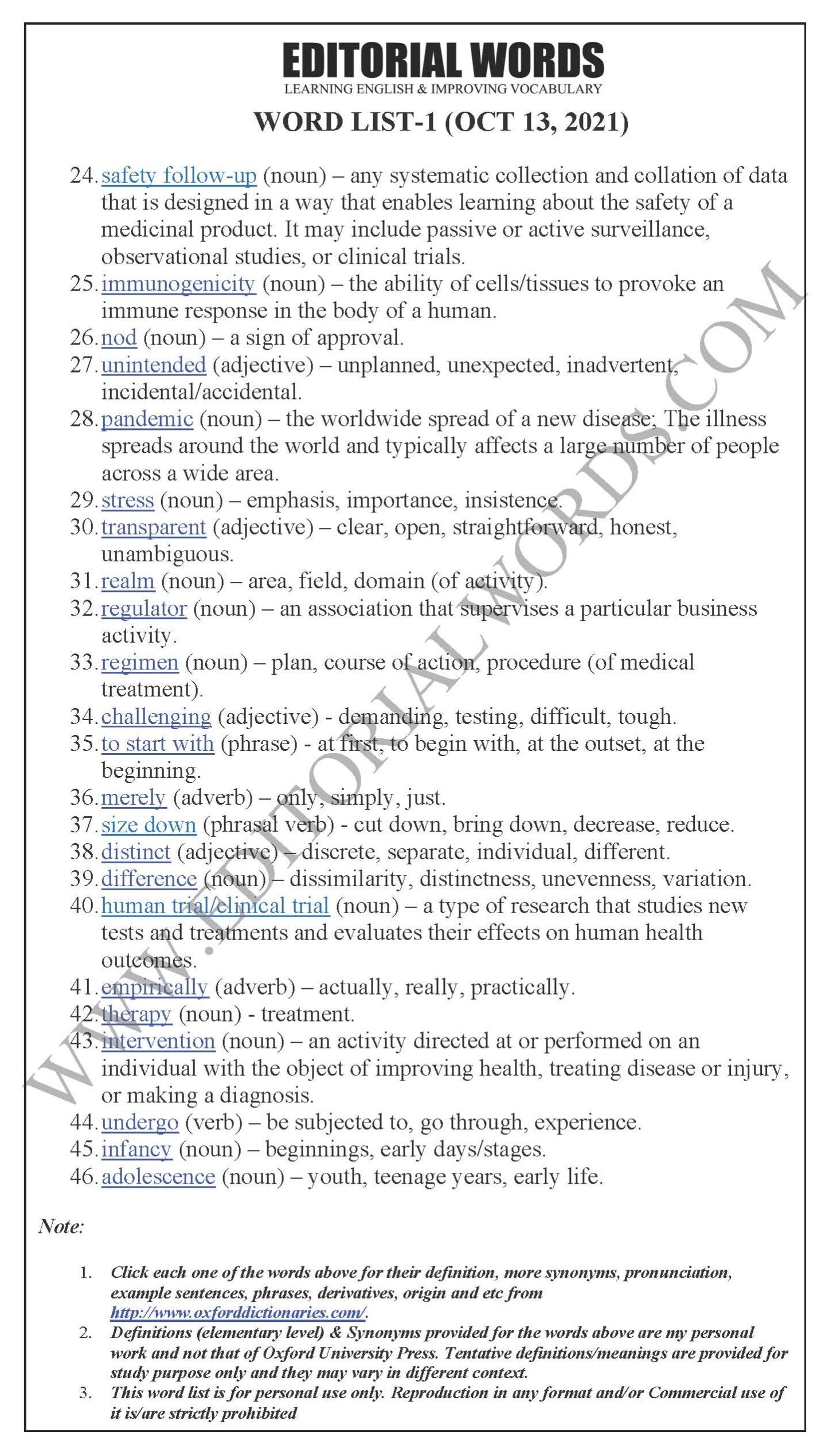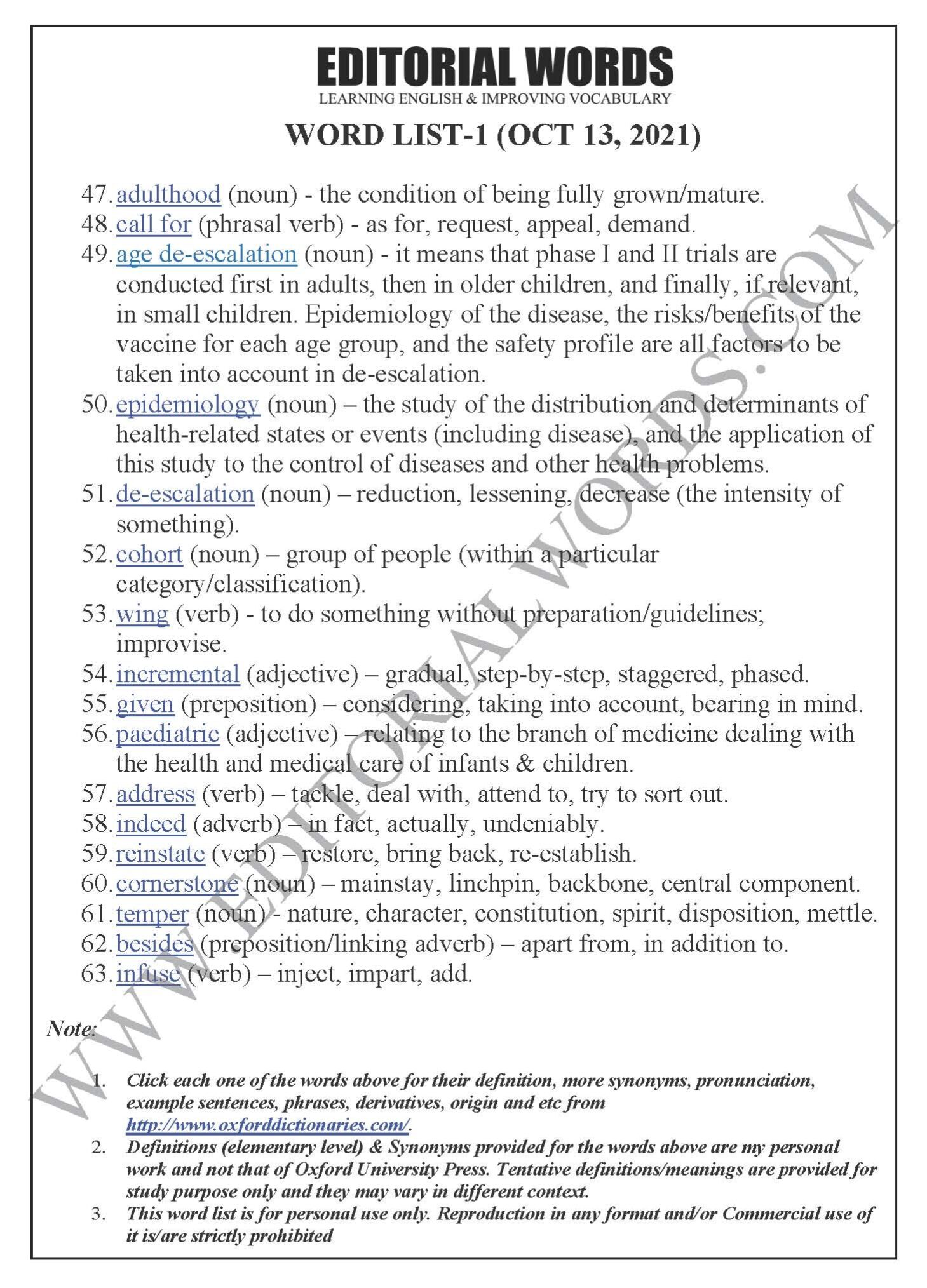The Hindu Editorial (Jabbing children) – Oct 13, 2021
As a milestone, the Subject Expert Committee’s (SEC) recommendation to the Drugs Controller to grant emergency use authorisation (EUA) for Covaxin among children aged 2-18 years, is huge. For further reading, visit “The Hindu”. Below is today’s word list-1 for The Hindu Editorial (Jabbing children) – Oct 13, 2021.
To read this article, click “The Hindu”.
This preview is provided here with permission.
Courtesy: The Hindu
The Hindu Editorial (Jabbing children) – Oct 13, 2021:
- jab (noun) – vaccination, injection, inoculation, immunization.
- jab (verb) – vaccinate, inoculate, immunize, inject (a vaccine).
- vaccine (noun) – a biological preparation that improves immunity to a particular disease.
- Covaxin (noun) – India’s first indigenous COVID-19 vaccine candidate (COVAXIN) developed by a Hyderabad-based company (Bharat Biotech) in collaboration with the ICMR (The Indian Council of Medical Research).
- transparency (noun) – clarity, straightforwardness, openness, honesty, unambiguity.
- data transparency (noun) – it means utilizing data with integrity (honesty) so that individuals know what data is being collected, who has access to it, and how they’re able to interact with it.
- vital (adjective) – key, essential, important.
- milestone (noun) – major achievement, historic event, significant stage, turning point.
- Subject Expert Committee’s (SEC) (noun) – The Central Drugs Standard Control Organization (CDSCO) plays an important role in safeguarding public health by ensuring efficacy, safety, and quality of drugs used in India. One of the important decision-making factors in the entire regulatory review process is Subject Expert Committees (SECs). In March 2011, the CDSCO constituted 12 New Drug Advisory Committees (NDACs), consisting of experts from government medical colleges and eminent institutions within India for review of regulatory applications including new drugs, fixed‑dose combinations, additional indications, and clinical trials (CTs). These 12 NDAC committees were re-named as “SECs” since July 2014. It was stated in this order that the members for these committees will be drawn randomly from a large pool of experts. Later in January 2015, a number of SEC panels were expanded to 25 in various therapeutic areas.
- Emergency Use Authorisation (EUA) (noun) – a mechanism to facilitate the availability and use of medical countermeasures, including vaccines, during public health emergencies, such as the current COVID-19 pandemic.
- Drug Controller General of India (DCGI) (noun) – Drugs Controller General of India (DCGI) is a department of the Central Drugs Standard Control Organization (CDSCO) of the Government of India responsible for approval of licences of specified categories of drugs such as vaccines, and etc. in India. Drugs Controller General of India, comes under the Ministry of Health & Family Welfare. DCGI also sets standards for the manufacturing, sales, import, and distribution of drugs in India.
- go ahead (phrasal verb) – to proceed, to continue to do something, to start/begin to do something.
- administer (verb) – dispense, provide, give, apply (a drug/vaccine).
- ZycoV-D Vaccine (noun) – a three-dose “plasmid DNA” candidate vaccine being developed by Ahmedabad-based Zydus Cadila. It is a vaccine that uses a genetically engineered, non-replicating version of a type of DNA molecule known as a ‘plasmid’. If approved by the regulator, ZyCov-D will be the world’s first DNA vaccine against infection with SARS-CoV-2.
- trial (noun) – test, pilot study, experiment (phase 1, 2,3, and or human/clinical trial).
- Covovax (noun) – The US-based Novavax, the maker of Covovax, as the vaccine has been named in India, developed in collaboration with the Serum Institute of India. The Novavax candidate, which is also known as NVX-CoV2373, is a “recombinant nanoparticle” vaccine with the company saying it is the “first protein-based option”.
- front (phrase) – a particular situation; a particular sphere of operation.
- cause (noun) – reason, grounds, justification, basis.
- considered (adjective) – carefully thought about, investigated, well-advised.
- in the public domain/realm (phrase) – if something (e.g. information) is in the public domain, people generally know about it since it is no secret.
- interim (adverb) – provisional, temporary, transitional.
- phase-3 trial (noun) – In phase 3 trial, the vaccine is given to thousands of people to confirm its safety – including rare side effects – and effectiveness. These trials involve a control group which is given a placebo.
- phase 2 trial (noun) – In phase 2 trial, the vaccine is given to hundreds of people so scientists can learn more about its safety and correct dosage.
- safety follow-up (noun) – any systematic collection and collation of data that is designed in a way that enables learning about the safety of a medicinal product. It may include passive or active surveillance, observational studies, or clinical trials.
- immunogenicity (noun) – the ability of cells/tissues to provoke an immune response in the body of a human.
- nod (noun) – a sign of approval.
- unintended (adjective) – unplanned, unexpected, inadvertent, incidental/accidental.
- pandemic (noun) – the worldwide spread of a new disease; The illness spreads around the world and typically affects a large number of people across a wide area.
- stress (noun) – emphasis, importance, insistence.
- transparent (adjective) – clear, open, straightforward, honest, unambiguous.
- realm (noun) – area, field, domain (of activity).
- regulator (noun) – an association that supervises a particular business activity.
- regimen (noun) – plan, course of action, procedure (of medical treatment).
- challenging (adjective) – demanding, testing, difficult, tough.
- to start with (phrase) – at first, to begin with, at the outset, at the beginning.
- merely (adverb) – only, simply, just.
- size down (phrasal verb) – cut down, bring down, decrease, reduce.
- distinct (adjective) – discrete, separate, individual, different.
- difference (noun) – dissimilarity, distinctness, unevenness, variation.
- human trial/clinical trial (noun) – a type of research that studies new tests and treatments and evaluates their effects on human health outcomes.
- empirically (adverb) – actually, really, practically.
- therapy (noun) – treatment.
- intervention (noun) – an activity directed at or performed on an individual with the object of improving health, treating disease or injury, or making a diagnosis.
- undergo (verb) – be subjected to, go through, experience.
- infancy (noun) – beginnings, early days/stages.
- adolescence (noun) – youth, teenage years, early life.
- adulthood (noun) – the condition of being fully grown/mature.
- call for (phrasal verb) – as for, request, appeal, demand.
- age de-escalation (noun) – it means that phase I and II trials are conducted first in adults, then in older children, and finally, if relevant, in small children. Epidemiology of the disease, the risks/benefits of the vaccine for each age group, and the safety profile are all factors to be taken into account in de-escalation.
- epidemiology (noun) – the study of the distribution and determinants of health-related states or events (including disease), and the application of this study to the control of diseases and other health problems (Courtesy: WHO).
- de-escalation (noun) – reduction, lessening, decrease (the intensity of something).
- cohort (noun) – group of people (within a particular category/classification).
- wing (verb) – to do something without preparation/guidelines; improvise.
- incremental (adjective) – gradual, step-by-step, staggered, phased.
- given (preposition) – considering, taking into account, bearing in mind.
- paediatric (adjective) – relating to the branch of medicine dealing with the health and medical care of infants & children.
- address (verb) – tackle, deal with, attend to, try to sort out.
- indeed (adverb) – in fact, actually, undeniably.
- reinstate (verb) – restore, bring back, re-establish.
- cornerstone (noun) – mainstay, linchpin, backbone, central component.
- temper (noun) – nature, character, constitution, spirit, disposition, mettle.
- besides (preposition/linking adverb) – apart from, in addition to.
- infuse (verb) – inject, impart, add.
Note:
1. Click each one of the words above for their definition, more synonyms, pronunciation, example sentences, phrases, derivatives, origin and etc from http://www.oxforddictionaries.com/.
2. Definitions (elementary level) & Synonyms provided for the words above are my personal work and not that of Oxford University Press. Tentative definitions/meanings are provided for study purpose only and they may vary in a different context.
3. This word list is for personal use only. Reproduction in any format and/or Commercial use of it is/are strictly prohibited.
The Hindu Editorial (Jabbing children) – Oct 13, 2021:




“Phrasal Verbs” We Learnt Last Week
“Idioms & Phrases” We Learnt Last Week
“Important Definitions” We Learnt Last Week
Recent Word Lists For The Hindu Editorial Articles

Be the first to comment